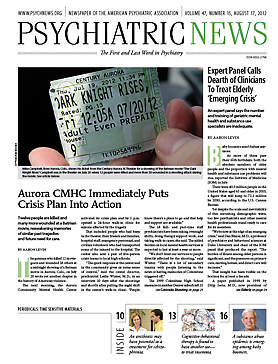As Kofi Annan, former secretary general of the United Nations, said eloquently, “Arguing against globalization is like arguing against the laws of gravity.” The world is more interconnected today than ever before. APA, whose primary focus is to be the voice of American mental health care, has also become much more internationally oriented during recent decades. In this column I will discuss the topic of expanding APA’s international activities—one of my priorities during the coming year. The goal is to increase APA’s international membership, as well as enhance our collaboration with international organizations on issues of clinical care, training, research, and public education critical to our field worldwide.
Historically, the first international psychiatrists joined APA in 1936 as corresponding members. Later, this designation was changed to international members. As summarized by Mel Sabshin, the late medical director of APA, in his outstanding memoir, Changing American Psychiatry: A Personal Perspective, the leadership of American psychiatry prior to World War II was mostly home grown, with a few noteworthy exceptions such as Weir Mitchell and Adolph Meyer. With the postwar immigration of many Austrian, German, and Central European psychiatrists to the United States, psychoanalysis became a central focus of American psychiatry; these expatriates transformed the practice of psychiatry in their adopted land.
Over the next several generations, American psychiatry became increasingly global, and it also has influenced international psychiatry. An obvious example is the worldwide adoption of DSM-III and DSM-IV. On another front, APA’s Committee on International Abuse of Psychiatry and Psychiatrists and its Committee on Human Rights were involved in ethical and human-rights issues around the world, notably in the erstwhile U.S.S.R., Chile, South Africa during the era of apartheid, and Cuba. The APA Board of Trustees has frequently spoken out against human-rights abuses pertaining to psychiatry globally.
Just as American psychiatry has contributed to the field of mental health internationally, we too have benefitted in a major way from the work of our colleagues in other countries. Approximately 15 percent of the members of the DSM-5 work groups are psychiatrists from outside of North America. The American Journal of Psychiatry and Psychiatric Services not only have gained increasing readership in different countries, but they also are receiving and publishing high-quality papers written by international researchers. The United States has imported treatments from other parts of the world, such as tai chi, meditation, and yoga, which are no longer considered alternative treatments but rather part of integrated health care. APA has been working with international organizations to promote cooperation. An example of this is the collaboration with the World Health Organization to help harmonize DSM-5 and ICD-11. We also are joining efforts with the World Psychiatric Association to distribute educational resources in countries where they are not easily accessible.
APA has more than 1,600 international members from more than 90 countries. These include 194 members from the Netherlands, 119 from Brazil, and 109 from India. There is a growing interest in joining APA among psychiatrists worldwide. A survey conducted during APA’s 2011 annual meeting among nonmember international attendees showed that many of them would like to be part of APA. International members especially value educational opportunities that APA provides, such as conferences and training, as well as access to journals and other informational vehicles. At the same time, our international colleagues have been a great resource of new ideas and intellectual capital. In addition to sharing best practices, they often serve as mentors for deciphering cultural nuances. A more interconnected world means more opportunities to work across borders. As psychiatrists, we all cherish our commitment to generate and disseminate knowledge, support psychiatric training, and provide outreach for people in need, no matter where they live.
I encourage international psychiatrists to consider joining APA and help us continue our efforts to enhance international connections and foster excellence in psychiatry across the globe. APA membership provides unique opportunities for career growth through education, networking, and collaboration. Among the many benefits of APA international membership are registration discounts to APA’s annual meeting and the Institute on Psychiatric Services; free online subscriptions to the
American Journal of Psychiatry and
Psychiatric News; discounts at the annual meeting on more than 700 titles (including
DSM) in 29 languages from American Psychiatric Publishing; discounted continuing medical education programs, including practice-guideline courses; and access to the APA Online International Referral Directory. We also work extensively on increasing the presence, visibility, and recognition of our international members at annual meetings and through other forums. There are other plans such as a column on international activities in
Psychiatric News. There are three categories of international membership— member, fellow, and distinguished fellow. Our international membership fees are scaled according to the World Bank Gross National Income categories: $50 for low-income countries, $125 for lower-middle-income, $175 for upper-middle-income, and $205 for high-income countries. Please visit the APA Web site at
www.psychiatry.org/join-participate/international-psychiatrists for more details. The APA Board of Trustees, at its most recent meeting, approved a one-time 25 percent discount for all new international members. I invite you to send us your suggestions regarding APA’s international activities.
To conclude, I echo what Mel Sabshin wrote: “Whether it is recognized or not, all psychiatrists are internationalists, and the field of psychiatry is international.”


